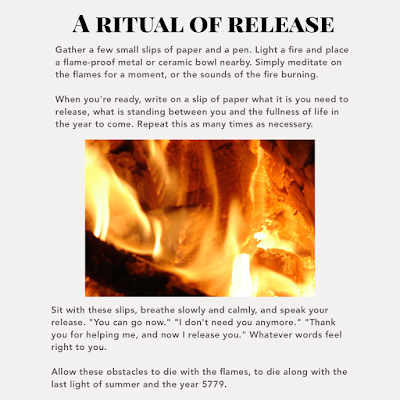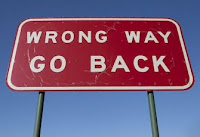I Am the Possibility of Teshuvah
...Now you must void yourself
of injuries, insults, incursions.
Go with empty hands to those
you have hurt and make amends.
It is not too late. It is early
and about to grow. Now
is the time to do what you
know you must and have feared
to begin. Your face is dark
too as you turn inward to face
yourself, the hidden twin of
all you must grow to be.
Forgive the dead year. Forgive
yourself. What will be
wants to push through your fingers...
--Marge Piercy, from "The Head of the Year"
On September 19, 2018, I woke up thirsty. Even though I hadn’t had anything to drink since right before sunset, I only sipped enough water that morning to swallow some Excedrin. I knew that without my morning coffee, I would quickly develop a headache if I didn’t proactively take some medicine, and this was not considered breaking the fast.
It was the morning of Yom Kippur, also known as the Day of Atonement.
The idea of earning Divine forgiveness for my sins through self-punishment does NOT resonate with me. But I was determined as I prepared for conversion last year to recognize the Jewish cycle of holidays, and Yom Kippur is one of the first, very near the Jewish new year (Rosh HaShanah).
So, as is my custom, I read about Yom Kippur until I found something that did resonate, something that allowed me to observe the holy day with intention and find meaning in it, to start my year off right.
I learned that in some strains of Jewish thought, Yom Kippur is meant to be a day in which you symbolically enact your death. So that morning, I did not participate in the morning routine of a living person. I didn’t bathe or brush my teeth… I dressed all in white, like a funeral shroud: simple and unassuming… and I refrained from eating and drinking. It all sounds a little macabre, I know, but bear with me a moment.
The idea of this ritual is to focus our attention on the fact that any day could be the last day-- our last day to live, or a loved one’s last day…Yom Kippur is a time to pause and reflect as the year dies, to remember that tomorrow is promised to no one, and a time to do something because of it.
For some people, this knowledge that the end could be near leads to a lavish “last meal” or other self-indulgence the night before. For others, remembering that their time is limited and could end at any moment encourages them to hold good boundaries so that they can focus their life more sharply on what is important to them. Often, a sense of fleeting life leads to freer declarations of love, and quicker forgiveness of petty slights.
The church I grew up in often asked us, “If you die tomorrow, would you go to heaven?” But observing Yom Kippur was different.
The day seemed to ask me, “If you die today, how will you be remembered on earth? And is that how you want to be remembered?... If you knew the person you were about to encounter was going to die today, how would you treat them?”
And there was plenty of time on Yom Kippur to reflect on these questions, partly because I wasn’t spending any time on the rituals of personal hygiene or food preparation!
The Rev. Stephen Rozelle says that we can bring something new into being through declaration - such as when a minister pronounces a marriage at the end of a wedding. He says, "To make a declaration is to invent yourself as the possibility of something."
Rozelle suggests choosing two words that hold the possibility of our best selves, words we can return to no matter what is happening around us. For example, “I am the possibility of welcome and joy.” When the committee meeting gets tense, I am the possibility of welcome and joy. When I am tired at the end of a long day, I am the possibility of welcome and joy. When the entire world is on fire, I am still the possibility of welcome and joy.
Of course, the thing about aspiring to our highest values is that we never truly reach them. Now, this does not mean that we should lower the bar, and aspire to something slightly less impossible. Instead, it means that we make a plan for what to do when we inevitably fall short--how we recognize and acknowledge those shortcomings, what we do as a result, and how we move forward.
The first move we must make is to notice that the path we are travelling is not heading in the direction we wish to go. We must name the truth that we have strayed from our intended direction. And then... we must turn around. Teshuvah, the Hebrew word for repentance, literally means, “to turn.” To do teshuvah is to re-orient ourselves, to turn around and do teshuvah, turn around and start heading again in the direction we mean to be travelling. We re-declare our aspirations and recognize them as continuing possibilities. This is what atonement is all about.
I invite you to consider, perhaps as you listen to the song below:
What possibilities are you?
Who do you aspire to be?
...Are you living into that vision?
What do you need to release today,
...what do you need to allow to fall away and die now in order to open up the space
to allow yourself to grow into your possibilities?
In order to recommit to our highest aspirations, we begin by recognizing the ways in which we have fallen short of them. But we cannot remain there, in our disappointment.
We must forgive ourselves.
We must forgive one another.
Only then may we begin again, in love.
Marge Piercy's poem asks us to void ourselves of injuries, insults, and incursions. But forgiveness does not require forgetting. The knowledge and lessons of our past are often the only gifts we can wring from the pain. Still, in order for new things to grow, to push through our fingers, the tangled underbrush must be cleared. We must make way for possibility.
Jewish scripture teaches that God does not forgive us for the harm we’ve done to another unless and until we have truly repented and sought forgiveness from the one we have harmed. Marge Piercy says that in order to do so, we must go with empty hands to those we have hurt and make amends.
But this can be incredibly challenging. One of the purposes of the month of Elul, immediately before the New Year, is to spiritually prepare yourself for such action.
You may be carrying pain you are unable to address directly.
Perhaps the person you hurt has died, or is unreachable in some other way.
Maybe you are the one who has been injured, and you need release from that pain.
Maybe you have injured yourself and it’s time now to let that go.
There's a ritual at the end of this post that may help you get started, if you need it, and I'm offering a course of reflections and prompts throughout the month to provide guided support.
We have each of us made a lot of mistakes. But every day is another chance to live into our aspirations. I am still the possibility of welcome and joy. Yom Kippur symbolically enacts death, but it ends with a celebration that we are not dead, that we have been given a reprieve, a second chance at life.
I am not sure what I think about the concept of a soul. I'm not sure I believe in the kind of God who pays close attention to each individual person and their prayers and guides their lives. But I do know that tomorrow is never guaranteed, and that every day I open my eyes is a gift, even if there is no anthropomorphic giver. Each morning is an opportunity to try again to live into my highest aspirations, to declare myself as a possibility.
And the new year is also a sort of second chance, whether in October or January. Those we've agreed to recognize together are each a collective opportunity to recognize the gift of waking up.
Any day, really, can be for us a time to pause, to intentionally reflect on who we wish to be, and to celebrate the fact that we have been given another moment, another year in which to try. May we use it well.
And remember, You are full of possibility.
If you'd like support this month in exploring this month how we might redeclare ourselves as possibilities, please join me in Turning Toward Life, my Elul reflection circle in which Tarot is our shofar (horn of awakening).
 |
| Click to enlarge |





Comments
Post a Comment